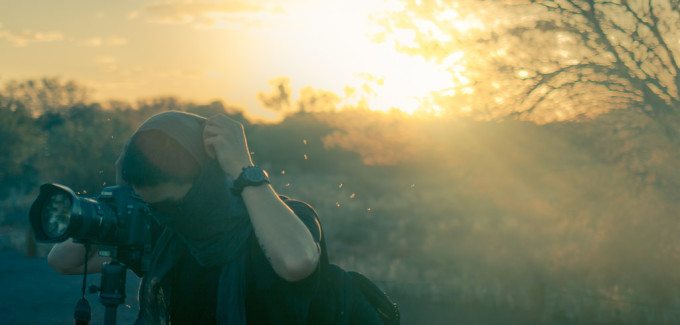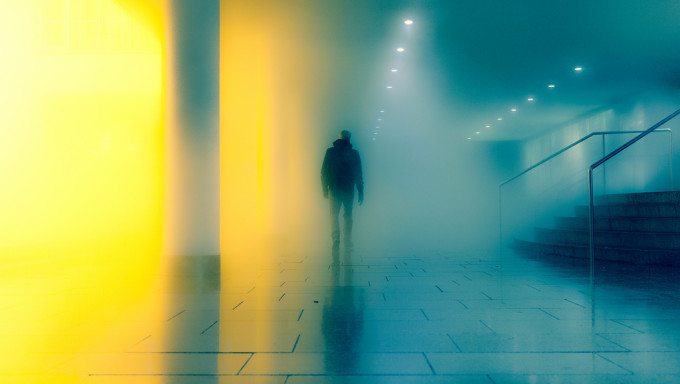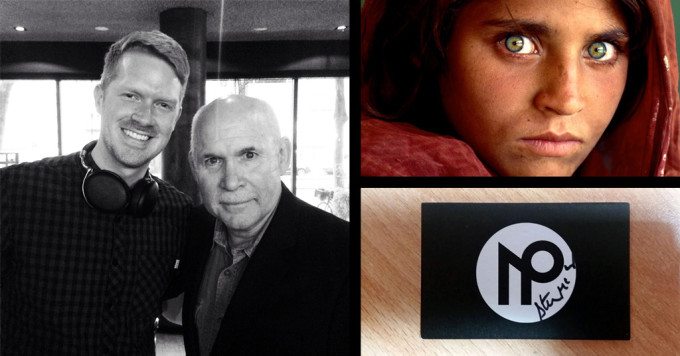Recently I had the unique chance to meet world-famous photographer Steve McCurry. You probably know him from his most-known photo “Afghan Girl” with the green-eyed girl covered in a red veil. Thanks to one of my awesome followers on Facebook (thanks again Amanda), they put me on the photographer’s guest list for this rather exclusive event in Amsterdam. Since there were only a few people there, I had the chance to ask him a couple of questions and talk to him for a while. These are the seven golden rules to success I learned from him.
#1 Understand The Importance Of Quantity.
“Shooting every other Sunday won’t help. You have to take at least 20,000 photos” he said. It’s of utmost importance to shoot as much as possible and keep it consistent. All the great photographers have spent day in and day out working on their craft and turn it from generic photos into masterpieces full of eye, heart and soul. But it takes a long time. When I look back on my own development, the first 2 years I couldn’t find myself at all in photography. Only after I did my 365 project, which meant taking photos every day for one year, I discovered myself in my photography and was able to pour all my heart and soul into them.
McCurry has been doing a 365 project basically for the last 40 years ever since he started with photography. From Stephen King and Ira Glass to McCurry all creative minds know that you have to generate a lot of output to create a masterpiece every once in a while. As far as I’m concerned, it’s better to shoot every day for one hour than once per week for 7. That way photography always stays in your mind and you start to think in photography.
#2 Don’t Strive To Become A Photographer.
This is one the lessons I learned the hard way. When I was 21 years old I wanted nothing more than to work in the advertising industry. I was able to come up with creative ads, but I wanted to be the next Don Draper even more. I was more in love with me being the next big shot creative director than actually becoming that. Goethe already said: “Everyone wants to be somebody, but no one wants to grow.” As you may have read, after being already burned out from University and my side job back then, I suffered from a severe depression for half a year.

Steve McCurry is totally right when it comes to not wanting to become a photographer. You should never think about yourself being a photographer. You just have to do it. Photography has to find you. Of course you buy a camera at a certain point and start taking photos, but it should always be just about expressing yourself. When I compare my two creative careers, photography is the one that felt exactly like that. To this day I don’t really think of myself as this or that, but rather define myself by just doing it. He told me that he never ever met a person who said that they wanted to become an art director or photographer that actually made it. They all failed after a while, because they lacked the intrinsic drive. He’s right, I failed miserably at becoming Don Draper. But let’s see where becoming Marius Vieth may take me one day.
#3 Your Eye, Heart And Soul Are Your Most Important Gear.
On the question whether gear plays a role for him, Steve fortunately shared my view. According to him, he absolutely doesn’t care about cameras and lenses. Whether he has to shoot with a Nikon, Canon, Fujifilm or Leica doesn’t matter at all. The more you think in gear, the less you pay attention to finding creative solutions for the subjects you love. If you want to learn more about the power of minimalism when it comes to gear, check out my article about Gear Avoidance Syndrome. I was really surprised by how minimalist he is. He even added that he doesn’t miss film at all and is happy to have the convenience of digital photography. Back then he brought rolls of film out of Afghanistan where he illegally took photos. “Believe me, it’s easier to smuggle a tiny SD card out of the country than 5 rolls of film.” he jokingly added. He doesn’t even own a camera bag. On top of that he told me that all that gear simply hurts his back.

#4 You Don’t Edit Photos, You Develop Them – And It’s Fine.
As far as post processing photos is concerned, he doesn’t really get the whole debate regarding Lightroom and Photoshop. According to him, most people don’t really see that these programs are merely the digital equivalent to the darkroom and choice of film and gear. Legends such as Henri-Cartier Bresson always developed their photos with dodging and burning, cropping and all sorts of techniques you have at your disposal in a dark room. Choosing a certain camera, lens, film, filter or whatever helps you take the photo is already part of the post processing. With digital cameras it’s the same although some of these influences are done on the PC. He stressed that as long as you are authentic (not like the disqualified 20% at the World Press Photo Awards) it’s absolutely fine to develop your photos and it can help a lot.

Post processing in Lightroom helps me for instance to create a photo that shows the way I saw and felt a moment. I never fundamentally change a photo. It’s merely the contrasts, clarity, colors and some lens correction. If a shot doesn’t already have incredible composition, strong colors and great natural contrasts, Lightroom won’t win you an award either. So take awesome photos, develop them properly according to your vision and signature and enjoy both elements of photography.
#5 Photos Really Don’t Have To Be Deep.
Do photos always need to have a deep meaning? According to Steve they don’t. Although he loves do generate awareness for certain issues worldwide, it’s just as good when a photo simply communicates the beautiful side of life. Since he was introducing his brand new book about coffee farmers and their struggles worldwide that night, he mentioned that his absolute favorite photo book of all time was done by an Hungarian photographer from the 80s who merely showed people reading the newspaper. The concept was so simple, but the photos were breathtaking and aren’t the simple things in life usually the most beautiful? I wonder whether he would like my set with people under umbrellas. Whatever, here’s a newspaper photo for you, Steve.

#6 If You Truly Love Photography, You Spend Your Time Taking Photos.
It’s as simple as that. It may seem so obvious that people who truly love photography spent their time taking photos, not doing something else. When asked why he wouldn’t spend his time teaching photography for most of the time, he responded: “Because others are better at it and I just want to capture golden moments.”
That doesn’t mean that you can’t do other things than photography and that marketing your photography and talking about what you are doing is wrong. It’s actually at least just as important, because otherwise no one notices your work. However, the ones that teach most of the time are usually not the best photographers according to him, because otherwise they would spend all their time working on their craft, forging their signature and extending their body of work. That’s why you usually don’t find the most brilliant entrepreneurs as economics professors in a university for instance. But they are usually way better at teaching and that’s why they are dedicating their life to doing just that.
#7 You Want To Make It? Go All In!
Steve started as a photographer for National Geographic when he was young, did a couple of commissioned projects for them but after a while he just left and did his own thing: traveling around the world and capturing moments he loves. He knows how incredibly hard it is to make a living off photography, but dedicating your life to it is simply what it takes. He has never met someone who became really famous by doing it part-time or in the weekends. It just doesn’t work, because it’s still a full time job that demands all your time and attention – although it’s the most fun job in the world. At a certain point you have to lose sight of the shore in order to set sail to new lands. It doesn’t hurt of course to create reliable income streams while doing a “real” job, having a backup plan and saving up money to leave you enough room to make your passion a full time job. Actually there should never be the questions whether you want to dedicate your life to photography or not according to him. It should be obvious. In order to “make it”, thus became well-know and live off it, photography should be the only thing you want to do.

I personally quit my safe, well-paying 9-5 market research job in an international media agency in February 2014 to travel around the world and turn my passion into my profession. Although I burned through all my savings, called toast and water my dinner way too often for more than a year and worked twice as much as I did before, by now I easily pay the rent with it and I’m finally able to live my office daydreams every day of my life.

It was such a rewarding and insightful experience to talk to a guy like Steve McCurry who already looks back on living his dream full time for almost half a century. It’s crazy how his formula of success works just as well in 2015. Despite being one the most famous photographers in the world, he still kept his humble, nice attitude and open-minded spirit when it comes to sharing his knowledge with young, uprising photographers. He was even so nice to sign the business card of my International Fine Arts Label NEOPRIME after I explained to him what we do. I mean, what could go wrong now?
So if it is your dream to turn photography from a hobby into a full-time profession, take these insights to heart, come up with your own ways to grow and make it your purpose in life to walk this 10,000 mile journey with pride, a camera in your hand and fire in your heart.



